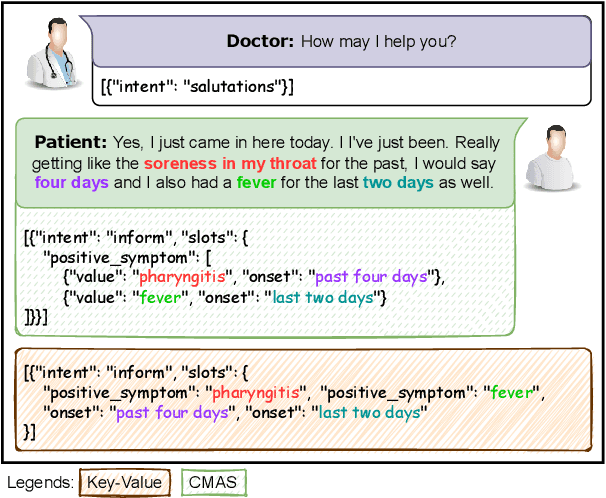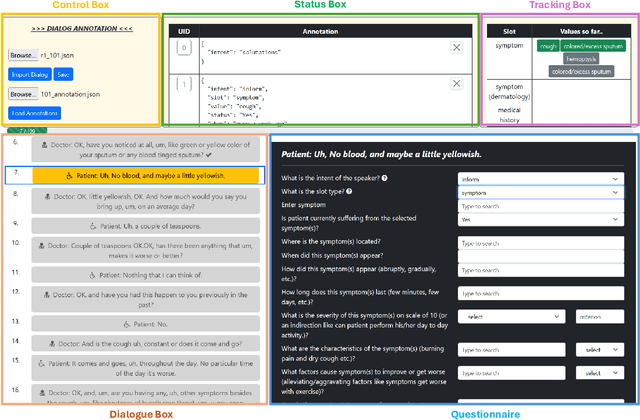Vishal Vivek Saley
MediTOD: An English Dialogue Dataset for Medical History Taking with Comprehensive Annotations
Oct 18, 2024



Abstract:Medical task-oriented dialogue systems can assist doctors by collecting patient medical history, aiding in diagnosis, or guiding treatment selection, thereby reducing doctor burnout and expanding access to medical services. However, doctor-patient dialogue datasets are not readily available, primarily due to privacy regulations. Moreover, existing datasets lack comprehensive annotations involving medical slots and their different attributes, such as symptoms and their onset, progression, and severity. These comprehensive annotations are crucial for accurate diagnosis. Finally, most existing datasets are non-English, limiting their utility for the larger research community. In response, we introduce MediTOD, a new dataset of doctor-patient dialogues in English for the medical history-taking task. Collaborating with doctors, we devise a questionnaire-based labeling scheme tailored to the medical domain. Then, medical professionals create the dataset with high-quality comprehensive annotations, capturing medical slots and their attributes. We establish benchmarks in supervised and few-shot settings on MediTOD for natural language understanding, policy learning, and natural language generation subtasks, evaluating models from both TOD and biomedical domains. We make MediTOD publicly available for future research.
Synergizing In-context Learning with Hints for End-to-end Task-oriented Dialog Systems
May 24, 2024Abstract:Large language models (LLM) based end-to-end task-oriented dialog (TOD) systems built using few-shot (in-context) learning perform better than supervised models only when the train data is limited. This is due to the inherent ability of LLMs to learn any task with just a few demonstrations. As the number of train dialogs increases, supervised SoTA models surpass in-context learning LLMs as they learn to better align with the style of the system responses in the training data, which LLMs struggle to mimic. In response, we propose SyncTOD, which synergizes LLMs with useful hints about the task for improved alignment. At a high level, SyncTOD trains auxiliary models to provide these hints and select exemplars for the in-context prompts. With ChatGPT, SyncTOD achieves superior performance compared to LLM-based baselines and SoTA models in low-data settings, while retaining competitive performance in full-data settings
DKAF: KB Arbitration for Learning Task-Oriented Dialog Systems with Dialog-KB Inconsistencies
May 26, 2023



Abstract:Task-oriented dialog (TOD) agents often ground their responses on external knowledge bases (KBs). These KBs can be dynamic and may be updated frequently. Existing approaches for learning TOD agents assume the KB snapshot contemporary to each individual dialog is available during training. However, in real-world scenarios, only the latest KB snapshot is available during training and as a result, the train dialogs may contain facts conflicting with the latest KB. These dialog-KB inconsistencies in the training data may potentially confuse the TOD agent learning algorithm. In this work, we define the novel problem of learning a TOD agent with dialog-KB inconsistencies in the training data. We propose a Dialog-KB Arbitration Framework (DKAF) which reduces the dialog-KB inconsistencies by predicting the contemporary KB snapshot for each train dialog. These predicted KB snapshots are then used for training downstream TOD agents. As there are no existing datasets with dialog-KB inconsistencies, we systematically introduce inconsistencies in two publicly available dialog datasets. We show that TOD agents trained with DKAF perform better than existing baselines on both these datasets
 Add to Chrome
Add to Chrome Add to Firefox
Add to Firefox Add to Edge
Add to Edge